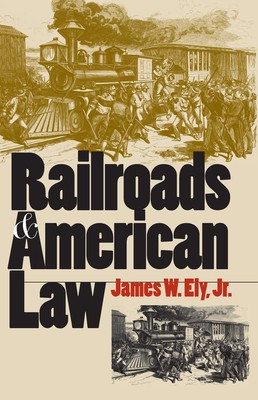
- We will send in 10–14 business days.
- Author: James W Ely Jr
- Publisher: University Press Of Kansas
- ISBN-10: 0700611444
- ISBN-13: 9780700611447
- Format: 13.7 x 30 x 2.9 cm, hardcover
- Language: English
- SAVE -10% with code: EXTRA
Reviews
Description
No enterprise is so seductive as a railroad for the influence it exerts, the power it gives, and the hope of gain it offers.--Poor's Manual of Railroads (1900
At its peak, the railroad was the Internet of its day in its transformative impact on American life and law. A harbinger and promoter of economic empire, it was also the icon of a technological revolution that accelerated national expansion and in the process transformed our legal system. James W. Ely Jr., in the first comprehensive legal history of the rail industry, shows that the two institutions--the railroad and American law--had a profound influence on each other. Ely chronicles how "America's first big business" impelled the creation of a vast array of new laws in a country where long-distance internal transport had previously been limited to canals and turnpikes. Railroads, the first major industry to experience extensive regulation, brought about significant legal innovations governing interstate commerce, eminent domain, private property, labor relations, and much more. Much of this development was originally designed to serve the interests of the railroads themselves but gradually came to contest and control the industry's power and exploitative tendencies. As Ely reveals, despite its great promise and potential as an engine of prosperity and uniter of far-flung regions, the railroad was not universally admired. Railroads uprooted people, threatened local autonomy, and posed dangers to employees and the public alike--situations with unprecedented legal ramifications. Ely explores the complex and sometimes contradictory ways in which those ramifications played out, as railroads crossed state lines and knitted together a diverse nation with thousands of miles of iron rail. Epic in its scope, Railroads and American Law makes a complex subject accessible to a wide range of readers, from legal historians to railroad buffs, and shows the many ways in which a powerful industry brought change and innovation to America.EXTRA 10 % discount with code: EXTRA
The promotion ends in 17d.15:14:02
The discount code is valid when purchasing from 10 €. Discounts do not stack.
- Author: James W Ely Jr
- Publisher: University Press Of Kansas
- ISBN-10: 0700611444
- ISBN-13: 9780700611447
- Format: 13.7 x 30 x 2.9 cm, hardcover
- Language: English English
No enterprise is so seductive as a railroad for the influence it exerts, the power it gives, and the hope of gain it offers.--Poor's Manual of Railroads (1900
At its peak, the railroad was the Internet of its day in its transformative impact on American life and law. A harbinger and promoter of economic empire, it was also the icon of a technological revolution that accelerated national expansion and in the process transformed our legal system. James W. Ely Jr., in the first comprehensive legal history of the rail industry, shows that the two institutions--the railroad and American law--had a profound influence on each other. Ely chronicles how "America's first big business" impelled the creation of a vast array of new laws in a country where long-distance internal transport had previously been limited to canals and turnpikes. Railroads, the first major industry to experience extensive regulation, brought about significant legal innovations governing interstate commerce, eminent domain, private property, labor relations, and much more. Much of this development was originally designed to serve the interests of the railroads themselves but gradually came to contest and control the industry's power and exploitative tendencies. As Ely reveals, despite its great promise and potential as an engine of prosperity and uniter of far-flung regions, the railroad was not universally admired. Railroads uprooted people, threatened local autonomy, and posed dangers to employees and the public alike--situations with unprecedented legal ramifications. Ely explores the complex and sometimes contradictory ways in which those ramifications played out, as railroads crossed state lines and knitted together a diverse nation with thousands of miles of iron rail. Epic in its scope, Railroads and American Law makes a complex subject accessible to a wide range of readers, from legal historians to railroad buffs, and shows the many ways in which a powerful industry brought change and innovation to America.

Reviews